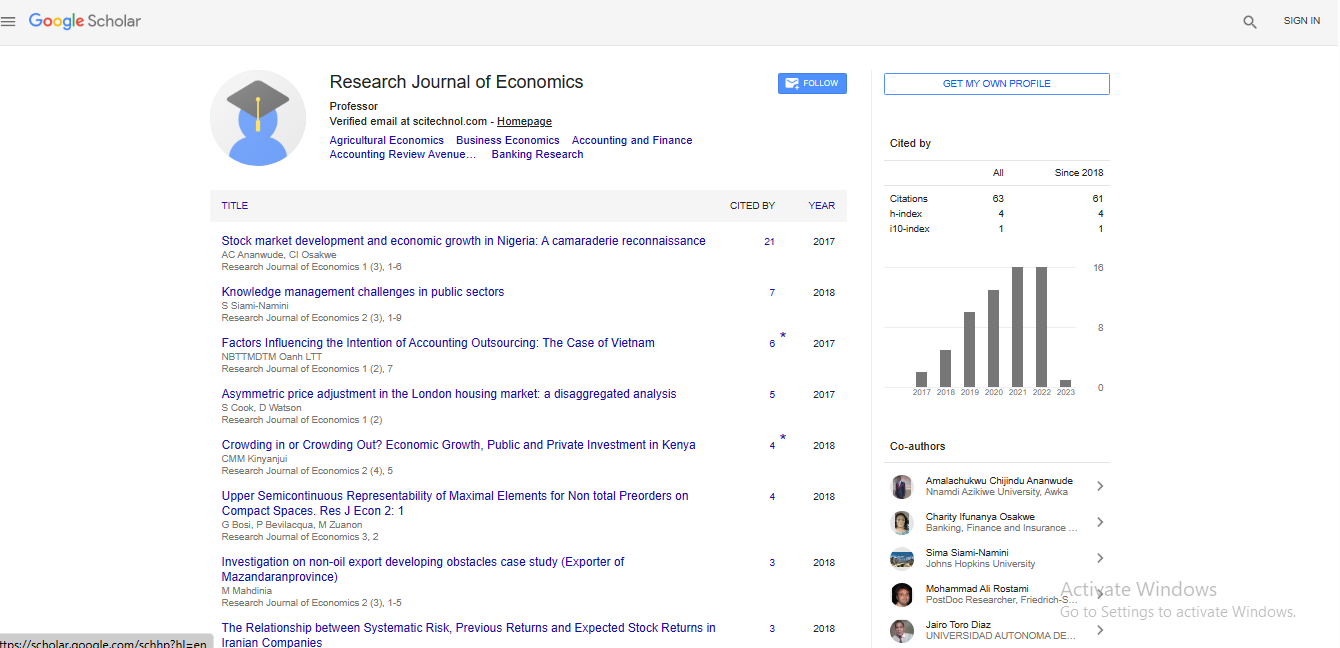Commentary, Rje Vol: 6 Issue: 2
Investigating the Ebb and Flow between Research and Industry Developments within the South African Business Management Landscape
Jacobus Bornman*,
Department of Business Management, University of Pretoria, Pretoria, South Africa
Corresponding Author: Jacobus Bornman
Department of Business Management, University of Pretoria, Pretoria, South Africa
E-mail: bornmanjacobus@yahoo.com
Received date: 07 January, 2022, Manuscript No. RJE-22-59526;
Editor assigned date: 10 January, 2022, PreQC No. RJE-22-59526(PQ);
Reviewed date: 25 January, 2022, QC No RJE-22-59526;
Revised date: 01 February, 2022, Manuscript No. RJE-22-59526(R);
Published date: 08 February, 2022, DOI:10.4172/rje.1000106
Abstract
According to Stats SA’s Quarterly Labour Force Survey released on 30 November 2021 the unemployment rate in South Africa reached an all-time high of 34.9% in 2021, which is an increase of 1% from 2020 to 2021. The reason for this increase is of course clear as the global coronavirus pandemic ushered in unimagined complexities. The United Nations (UN) secretary general, António has called for the world to react decisively, innovatively and to collaboratively conquer the rise of the virus whilst also responding to the socio-economic devastation that the virus is causing world-wide. The question surrounding this global problem in terms of its economic impact is therefore not focused on how this problem can be solved, but rather on what the effects of this pandemic have been on entrepreneurs, as well as the general academic landscape of entrepreneurship and business management education in developing countries such as South African
Keywords: Management Landscape
Abstract
According to Stats SA’s Quarterly Labour Force Survey released on 30 November 2021 the unemployment rate in South Africa reached an all-time high of 34.9% in 2021, which is an increase of 1% from 2020 to 2021. The reason for this increase is of course clear as the global coronavirus pandemic ushered in unimagined complexities. The United Nations (UN) secretary general, António has called for the world to react decisively, innovatively and to collaboratively conquer the rise of the virus whilst also responding to the socio-economic devastation that the virus is causing world-wide. The question surrounding this global problem in terms of its economic impact is therefore not focused on how this problem can be solved, but rather on what the effects of this pandemic have been on entrepreneurs, as well as the general academic landscape of entrepreneurship and business management education in developing countries such as South African. Individuals studying on a tertiary level in the field of entrepreneurship or business management have always been viewed as being a step ahead of individuals who would want to pursue a career in business, but who do not have the theoretical understanding of concepts or literature. Graduandi however do not necessarily have the technical, practical and on job training knowledge base of individuals who have been working in industry. This has however come to a point where the potential of becoming or being an entrepreneur is no longer linked to the completion of tertiary education, but rather linked to increasing an entrepreneur’s potential, developing a thorough theoretical academic knowledge base and enhancing self-efficacy of entrepreneurs. The question then becomes, what is the gap that has emanated between academia and industry, and how should business research and education be re-aligned toward assisting entrepreneurial development? In order to address this pressing issue, the focus needs to fall on what is currently seen as imperative research being conducted within the field of business management, what is being taught in the academic sphere and which trends are developing. Once this is established, the questions develops into how can academia and industry re-align or amend the current business management landscape into one which is conducive to rectify aspects such as unemployment, poverty or under developed communities or societies. Trends within the field of business management research in South Africa that have been growing in popularity include, but are not limited to: Networking, business-to-business relationships, the role of leadership, and business sustainability. The rapid rise of technology especially that of the 4IR has also played a major part in re-shaping the business landscape, and even more so in developing countries where there might be a lack of proper infrastructure and current academic know-how to assist growing industry needs.
Theory of Planned Behavior in Entrepreneurship
Drawing on the theory of planned behavior, the main purpose of this cross-sectional study was to identify gender-related differences in the levels of and the interrelations among attitude toward entrepreneurship, perceived behavioral control, and entrepreneurial intention using multi-group structural equations modeling in which the dimensions of these constructs were disentangled and treated as latent variables that were indirectly inferred from multiple indicators. The sample of the study consisted of 441 Greek tertiary education undergraduate information technology students. The results showed that attitude consists of two components one instrumental and one affective; perceived behavioral control is comprised of two factors perceived self-efficacy and perceived controllability; and entrepreneurial intention is best represented by three factors choice intention, commitment to entrepreneurship, and nascent entrepreneurship. The findings indicated further that affective attitude and perceived self-efficacy are by far the strongest predictors of intention, thus highlighting the role of emotions in the entrepreneurial process. Our work revealed also that the relationship between commitment to entrepreneurship and nascent entrepreneurship is stronger in men than in women. Conceiving nascent entrepreneurship as a proxy for entrepreneurial behavior, this finding implies that gender is a moderator of the entrepreneurial intention-action translation. Despite its limitations, this study makes some important contributions and implications to the literature of entrepreneurship. These and future research suggestions are also discussed.
 Spanish
Spanish  Chinese
Chinese  Russian
Russian  German
German  French
French  Japanese
Japanese  Portuguese
Portuguese  Hindi
Hindi 